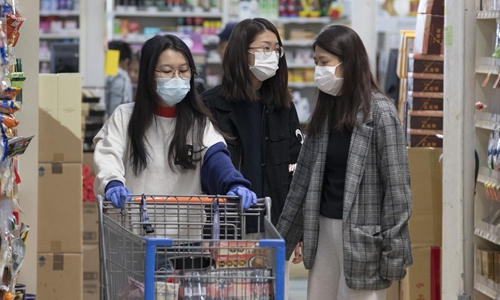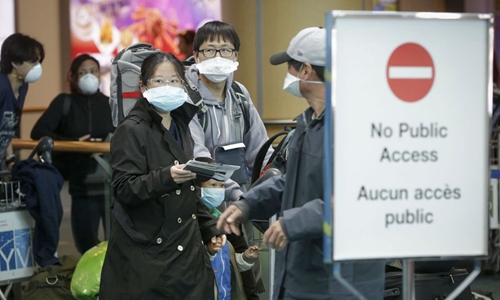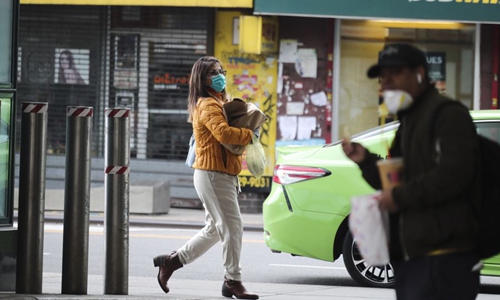HOME >> WORLD
Time for China to help US fight against pandemic
By Chen Qingqing, Bai Yunyi and Wang Cong Source:Global Times Published: 2020/3/21 14:56:20 Last Updated: 2020/3/22 23:49:37
China to provide help for US at subnational level amid COVID-19 outbreak

Three women wearing face masks shop in a supermarket in San Francisco, the US on March 9. Photo: CNS photo
As the number of coronavirus infections spirals out of control in the US, observers and analysts believe it is time for China to consider lending a hand to hard-hit US states in fighting against the deadly coronavirus based on humanitarian grounds despite Washington's escalating xenophobic slurs and hostility toward Beijing by repeatedly calling the novel coronavirus the "Chinese virus."
Some Chinese organizations, hospitals and individuals are planning to provide more help to local medics and hospitals in the US, who are also eager to learn more about China's clinical experiences in treating critically ill patients and seeking support for personal protective equipment (PPE) supplies such as N95 face masks and surgical gowns, according Chinese observers, medics and industry insiders.
In states like California and New York, which have maintained long-term subnational cooperation with China, and are also home to most Asian-American communities in the country, some local groups are now helping state governments and local hospitals to reach out in purchasing supplies from the world's largest manufacturer.
Some American medics and experts reached by the Global Times also called for national-level cooperation between the two countries, which will help tackle supply shortages more effectively.

Travellers wearing face masks are seen at Vancouver International Airport in Richmond, Canada, March 16, 2020. (Photo by Liang Sen/Xinhua)
Calls for help
A California-based medical expert, who preferred not to be identified, told the Global Times on Friday that some local medics are eager to know if China has plans to donate medical supplies to local hospitals, as it did to Italy, as more medical staff in the US state stand exposed to the deadly disease, in addition to inadequate supplies of protective masks, ventilators, and intensive care beds.
"The immediate need is for more PPE and testing capabilities," Larry William Chang, an infectious diseases expert from of Johns Hopkins School of Medicine, told the Global Times via email.
Chang noted that the major challenges the US faces include inadequate supplies of PPE, ventilators, and overall health system capacity. "We also do not have some of the technological innovations such as phone-based monitoring apps to help with contact tracing and isolation," he said.
The overall confirmed cases of coronavirus in the US have surpassed 27,000 as of Sunday, which are almost 10 times higher than a week earlier, data compiled by Johns Hopkins University.
An increasing number of people in the US are also calling on local governments to seek cooperation with China to beat back the virus, as the US federal government has been failing to help.
"If the federal government and their clown for a president won't help states like California, they should go to China for help," one social media user tweeted Friday.
China can help the worst-affected US states like California, New York, and Florida, which have relatively fewer cases but a huge elderly population, by sending ventilators, according to several observers in the US.
"If China wants to look very good right now to America, it will be about ventilators," one observer based in California told the Global Times on Saturday, adding that most states will manage other supplies such as masks. "I think [New York and Florida] would accept Chinese aid."
A representative from a New York-based Chinese association, who preferred not to be identified, told the Global Times during the weekend that the association has been reaching out to companies in China to purchase medical supplies while it still takes time to ship products to the US. "We've been communicating with other states too, though it's not easy but we'll do our best to make orders," she said, noting that it has ordered over 10,000 units of medical equipment, which are still too little compared to surging demand in hospitals everyday.
New York Governor Andrew Cuomo recently said "we literally have people in China shopping for ventilators which is one of the largest manufacturers," while President Donald Trump asked governors that they should be buying medical supplies for their states and that the federal government is not a "shipping clerk."
Local media New York Post said in an article on Friday that coronavirus killed city residents "at a rate of more than one per hour." Facing the unprecedented crisis, the city's medical system is also nearing a crisis point due to critical shortage of lifesaving ventilators, machines, and more medical workers are overwhelmed as there have been inadequate supplies for doctors.
Shortage of supplies and medical equipment, growing risks among medical staff getting infected, and hospitals being overwhelmed were part of scenarios at the early stages of the outbreak in Wuhan, Central China's Hubei Province, where the first confirmed novel coronavirus pneumonia (COVID-19) cases were reported in January in the country.
When Washington tried to pass the buck to Beijing by blaming China's delayed pandemic response for the rapid surge of cases in the US, which are now crashing its healthcare system, the Chinese foreign ministry said on Friday that the Chinese side has been notifying the US of epidemic development, prevention and control measures on a regular basis since January 3. Meanwhile on January 27, key health officials in China and the US spoke on the phone, and at the time, the US side appreciated the Beijing's transparency in response to the outbreak.
Unfortunately, without drawing lessons from Wuhan's scenario, Washington's passive response to COVID-19 led its own medical staff unprepared for the current crisis.

A pedestrian wearing a face mask walks along a street in New York, the United States, March 16, 2020. (Xinhua/Wang Ying)
People-to-people ties
When Trump kept playing down the impact of the coronavirus, shifting the blame to China, which, some observers said, aimed to hide the administration's inadequate preparation for this crisis, some doctors and medics in different US states such as New York, California and Maryland have started to seek help from China, particularly from Chinese medics who have had experiences in fighting this battle at the frontline.
Shmuel Shoham, a transplant infectious diseases physician at Johns Hopkins, shared a Tweet on Friday saying, "right now over 80 doctors at Hopkins and at hospitals in China just finished a meeting via videoconferencing. The doctors in China taught us from their recent experience."
Some Chinese hospitals have begun offering clinical and treatment experiences to some US doctors and medical experts. For instance, the First Hospital of Zhejiang Province had a videoconference call with some experts at Yale University on Wednesday.
Chinese experts answered questions including "what the core experiences are in dealing with the virus?" "what the experiences are in treating patients who are critically ill?" "what the standards for ICU treatment are?" "how to protect medics from infections?" and so on, according to media reports.
"I think the teleconference call we had was a great example of China and US cooperation at an institutional-level. At the national-level, any ability for China to help with our supply shortages would be wonderful." Chang said.
However, the US federal government continues to smear China by ignoring the fundamentals of science by labeling COVID-19 as the "Chinese virus", sparking outrage among not only Chinese but also Asian Americans., Such offensive tactics lowered chances for Beijing and Washington to work together at a national level, particularly some "racist and xenophobia-driven attacks" on China which have become unacceptable, inflaming the spat of words between the two countries, according to observers.
It would be more valuable for China to work with the US at the subnational or local level, which could be also be meaningful, Li Haidong, a professor of US studies at the China Foreign Affairs University, told the Global Times.
RELATED ARTICLES:
Posted in: AMERICAS